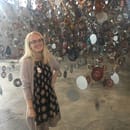Above, an advertisement for a blue light filter, developed by Ignis App Studio, as found on Google Play.
When I was a kid, I used to get major headaches all the time. Eventually I noticed that these headaches were happening whenever I was in a bright place, be it in the sun or in fluorescent light. My blue eyes were just too sensitive to this abundance of light, so I got glasses. They seemed to fix my problem, but since I got into the habit of always being on my phone, those headaches began to come back. That’s when I learned about blue light.
Blue light is what we use for all our technology and most of our indoor lighting. It’s a type of light that has a very short wavelength; that means it produces a high amount of energy. This causes a larger strain on our eyes than other types of light, which can hurt them over time. On top of that, it could interfere with our sleep.
Any type of light can mess with our sleep cycle because our circadian rhythms (our “body clocks”) are based off of light. The more exposed we are to light during the night, the less likely it is that our bodies will create melatonin, the chemical in our brain that makes us fall asleep. Blue light seems to be particularly harmful for our sleep cycle, especially since many people tend to be on their phones before falling asleep.
I am not going to tell you to stop using your phone, but it would be beneficial to consider some ways of reducing blue light. If you have a Samsung phone, this is easy. Samsung has a built-in setting where you can put a blue light filter on your phone. This will make the light emitted from your phone look a little bit more orange and is a small change that will result in better sleep and less eye strain. Apple has a “night shift” that will allow you to change your phone light at night to reduce the exposure of blue light. There is also software for other phones or laptops that will allow you to change the light settings. If you keep lights on in your room before falling asleep, consider getting some red-light bulbs. Red light is proven to be better for sleeping because it is less strain on the eyes and won’t block the production of melatonin.
If you do this, you can stay up late on social media or finish papers without straining your eyes or being too concerned about your sleep schedule. Getting a good night’s sleep is very important, and difficult when trying to manage your busy life. So, don’t let blue light hold you back.


